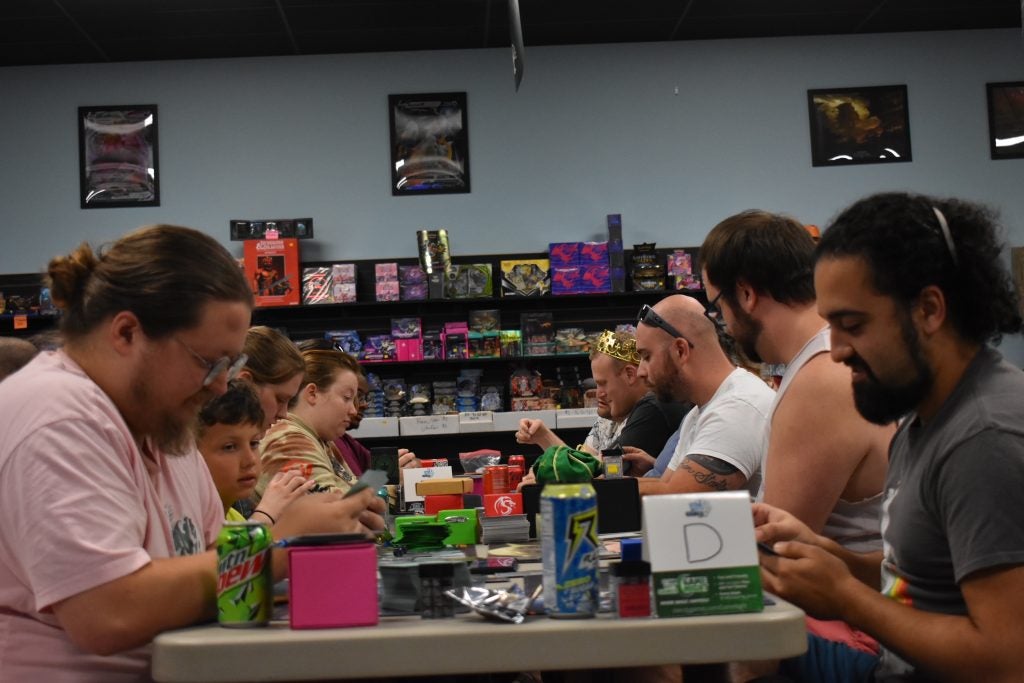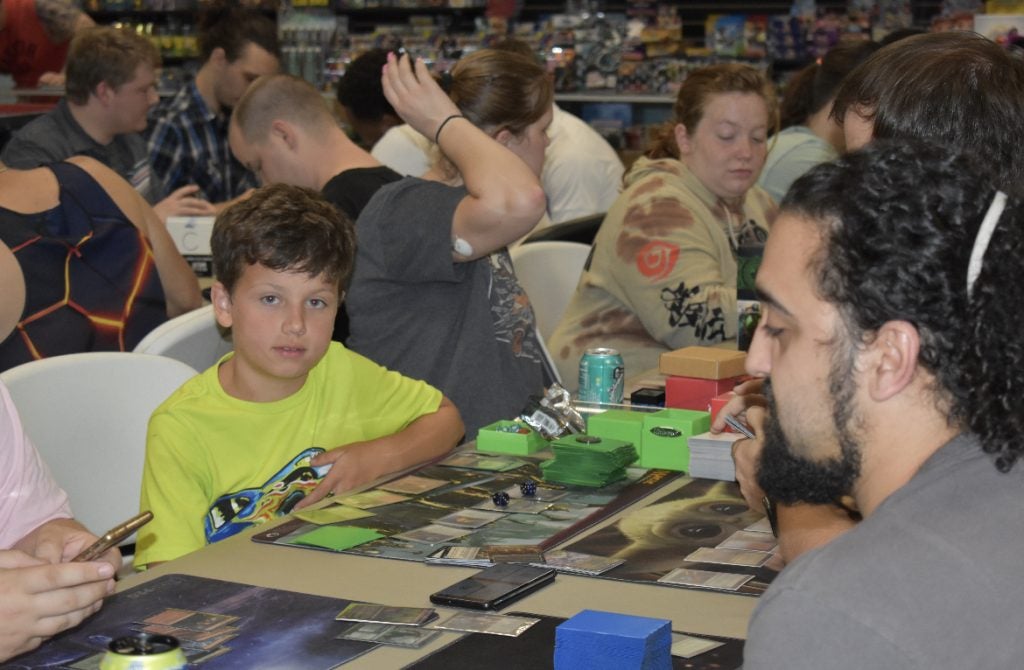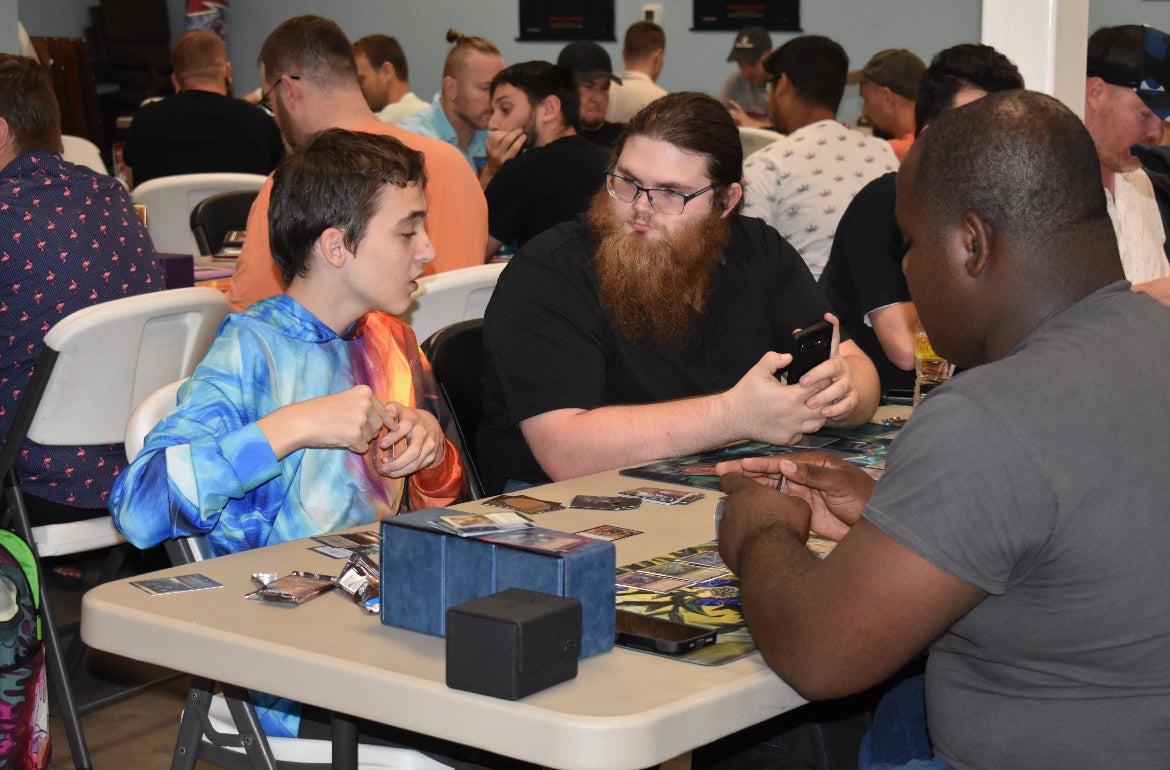During the summer months, many families are able to vacation and spend meaningful time together to strengthen their relationships. However, as children readjust to their school routines and friends, some parents might wrestle with how to maintain a close bond with their kids.
Some say having a family game night is one way to forge those ties.
“I grew up in a house where we played games all the time, and I mean all the time. We always had a huge stack of board games in the house. My parents played. My grandparents played,” said Andrew Rauch, an avid player of Magick of the Gathering. “Games are how I connected and spent time with my grandparents. I would always play Scrabble with my grandmother.”
MORE: Time is running out to vote in the Press Play Songwriter Contest
Rauch believes games teach critical thinking, problem solving, social skills, cooperation and even math and reading. As a child Rauch recalled learning “crazy words” from playing Scrabble with his grandmother and continually losing to her. Even though losing could be frustrating, he still found it enjoyable, and it forced him to expand his vocabulary and become a better reader in an attempt to win. Games like Clue taught him problem solving and how to ask the right questions to get closer to the answer.
“Those are all things I wouldn’t have learned without tabletop games,” Rauch said. “Kids are actively learning without realizing it. When you make learning fun, they forget that they are learning. It’s not like a classroom where kids have to sit, write and memorize. You can learn all kinds of things in a game.”

Zachary Dobbs, former Director of Bands at Fox Creek High School and skilled Magick participant, said he struggled as a kid with reading and math until he was introduced to card games.
Card games and learning the rules helped him understand nouns versus verbs, while it also improved his math skills by keeping track of points and adding them together. He believes it helps develop cognitive skills as well as strategic planning.
Rauch also believes parents should choose to have a game night rather than a movie night because tabletop games encourage more involvement and interaction. They allow families to actively think and talk with each other, rather than silently sitting together and blocking each other out by focusing on a screen.
“It’s quality time with your family that’s not electronic. It’s not television; it’s time together where you are actively doing something,” he said. “You’re learning something together. It teaches life skills you’re going to use your entire life, in my opinion.”
Dr. Karen Carter, owner of Augusta Developmental Specialists and general pediatrician, said family game nights can help develop a child’s brain while strengthening family bonds.
“It builds a lot of trust, and it builds a lot of love. It’s just so beneficial to the family, and if you’re able to talk about little things then you’re able to talk about the bigger things,” she said.
Carter reaffirmed how game nights can help build academic and language skills, as well as fine motor skills with the increased usage of hands. She believes a game night is beneficial on every level and encourages children to stick to the doctor recommendation of no more than two hours of screen time per day.
Where a long movie can eat up a decent portion of electronic time, board or card games will only help build connections and develop conversational skills between parents and children.
However, Carter also realizes how game nights can sometimes be frustrating for families.

“It can be a challenge because kids don’t like to lose. Kids don’t like to wait their turn, but it also makes games a great avenue for teaching those things,” she said.
To help children with impatience or anger, Carter suggests parents start out with short, small games that do not involve long turns or a lot of people.
“Have them play with just one kid or parent so that they get used to having to wait for their turn without getting frustrated. Encourage them and maybe even have them play a game with just other kids so they learn to be patient with their peers,” she said.
Meanwhile, Robert Temenak, co-owner of Cardboard Castle Games, a gaming store and café on Mullins Colony Drive in Evans, suggests parents play cooperative games instead of competitive ones for families who get passionate or emotional when pitted against each other. His business holds a board game event from 1 to 3 p.m. on Sundays.
“There are cooperative games where you all play as a team and play towards completing a goal or beating the game,” he said.
Carter said cooperative games build community and positive interactions between family members while building strong feelings.
Temenak said card games, as a kid, also taught him how to appreciate his items and keep track of their value.
“It even made me like collecting them and interested in selling them, so I knew I had to take care of my things,” he said. Unlike computer and video games, tabletop games are significantly less guided and even teach participants how to read people in order to win, like Poker, which can become a vital skill in the workplace. “Computer games and stuff guide you a lot more and you don’t have to search a lot for the knowledge and experience like you do with tabletop games.”
He also added how games, like any hobby, give people an easy way of connecting with strangers and making long-term friends.
Matthew Wright, who began playing at the cafe when he was 14 years old and now works there part-time over the summer, said card games like Magick of the Gathering opened the doors to several opportunities.
“I’ve always been someone who liked strategic games a lot and it was always a good outlet for me, especially in middle school. It just sort of became a great extracurricular for me,” said Wright, Augusta’s Magick champion. “I definitely learned a lot of social skills. I didn’t grow up being the most socially adept person but playing Magick helped a lot with that because you interact with those who you are playing against. I met a bunch of friends through playing Magick.”
Where sports are often skillset or reaction based which encourage ‘thinking in the moment’, Temenak said tabletop gaming is different because it forces a player to think ahead and consider several paths.
“It’s similar to chess where you have to think five steps ahead of every move you make,” he said.
MORE: A day of volunteering will kickoff United Way fundraising campaign
However, Wright argues there is very little difference between sports and tabletop gaming and believes differing the two leads to unfair stigma.
“I think a lot of people think it’s just some nerdy thing that’s a waste of time or money, but really I’ve gotten so much out of this game.” Wright even spoke about how he got into college at Georgia Tech by writing about Magick, and also utilized the game to raise money for charity for his senior project.
To Wright, Magick has become a staple in his life and has encouraged him to meet some of his closest friends.
Temenak said the biggest mistake parents can make when trying to implement a family game night is sticking to the traditional, classic games such as Monopoly, Trouble and Game of Life. He said these games take a long time and are often not enjoyable for a group made up of different ages. He suggests cooperative games instead.
“Cooperative games allow everyone to have fun and encourage players to even help each other if one person is failing or falling behind,” he said.
And there are plenty of games to choose from.
According to Temenak, more than 5,000 board games are made every year and not all of them are going to be good. Some games are long, some are short, and some are made for different age groups. In order to get the best fit, he recommends parents visit a game store and talk with an associate who can help pick out the right fit for your family’s needs.
Liz Wright is a staff writer covering education and general assignments for The Augusta Press. Reach her at liz@theaugustapress.com)














